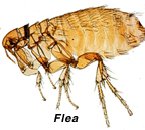Maine Coon Cat Fleas:
Small Parasite BIG Problem!
|
Maine Coon Cat Fleas are external parasites that not only annoy your pets, but can be detrimental to your pets health and lead to many health conditions including: |
 |
1. Bites: Cause pain, irritation and inflamed red skin. The bite often creates an allergic reaction and a condition called dermatitis.
2. Flea allergy dermatitis: Flea bite hypersensitivity or flea allergic dermatitis is very common in cats and can be severe. It is believed that flea saliva is the actual cause for the skin reaction and sensitivity.
The first sign that your cat has a flea allergy is usually frequent and severe itching and scratching, hair loss, and scabs on their cat's skin. In most cases the hind end is affected more than the front of the body or the head, however, cats that are suffering from an allergy to fleas can have lesions anywhere on the body. Fleas are not always easy to detect and fleas or flea dirt may or may not be readily visible.
Symptoms: The cat's response to the intense itching is to chew, lick, or scratch the affected site or sites. This causes hair loss and can lead to open sores or scabs on the skin, allowing a secondary bacterial infection to develop. The area most commonly involved is over the rump, just in front of the tail. Many flea-allergic cats chew or lick the hair off their legs. Itching and hair loss around the tail base, neck and head should be considered suspicious for flea allergy dermatitis. In addition, the cat may have numerous, small scabs around the head and neck. These scabs are often referred to as miliary lesions, a term that was coined because the scabs look like millet seeds.
Use a flea comb to inspect your pet for fleas and flea dirt (small black specs that are actually the fleas "droppings") If none is evident but the itching is persistent sometimes the best thing to do is to just treat for fleas.
3. Anemia:In Severe cases fleas can result in Anemia is the term used to describe reduced numbers of red blood cells in the circulation. This is only rarely and usually in kittens or older cats.
4. Infectious disease transmission: fleas are involved in the transmission of several infectious diseases including the flea tapeworm (Diplydium Caninum), feline infectious anaemia, and rabbit myxomatosis virus.
Regular Flea Treatments are recommended for all Cats.
Cats living indoors can have fleas year round.